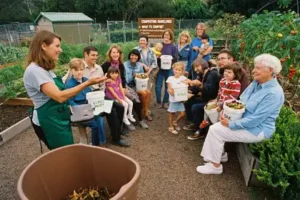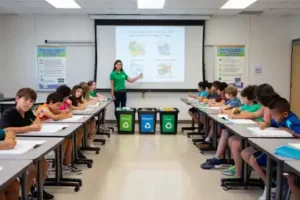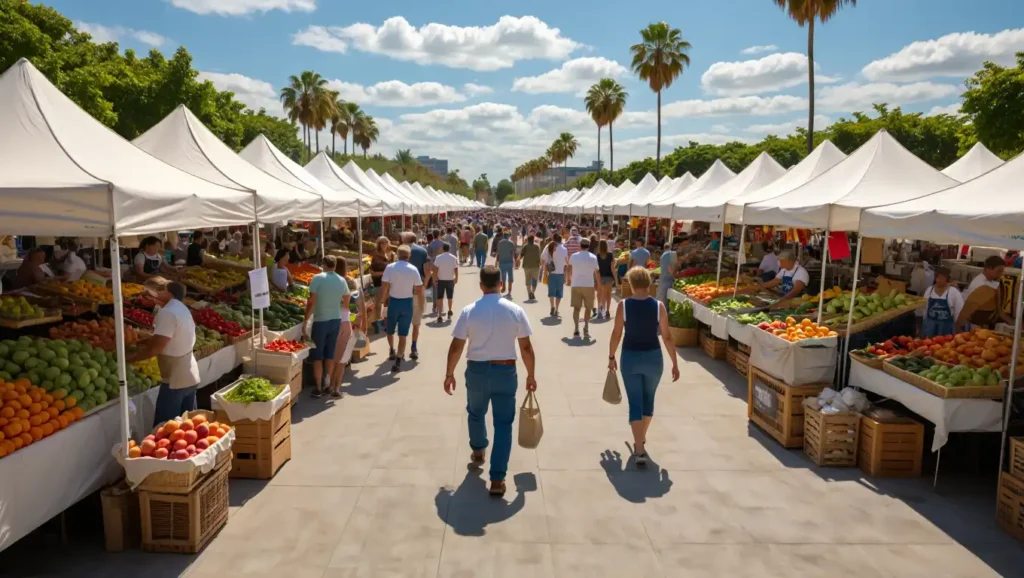Zero-waste living means minimizing the amount of trash sent to landfills by rethinking consumption habits and prioritizing reusable, recyclable, or compostable alternatives. It’s about making intentional choices that conserve resources and prevent pollution at every stage—shopping, eating, cleaning, and even socializing. Adopting this mindset goes beyond personal actions. Community efforts play a critical role in creating lasting change by making sustainable options more accessible and normalizing waste reduction practices.
This article explores:
- How leading California communities like the East Bay Area, San Diego, and Santa Rosa champion zero-waste living
- Strategies and real-life examples from residents and organizations
- Common approaches these communities use to empower individuals
- Practical tips you can apply to support zero-waste goals where you live
Zero-Waste Living: Tips from Leading California Communities highlights collective action as the driving force behind sustainable lifestyles that benefit everyone.
East Bay Area: A Hub for Zero-Waste Living
The East Bay area stands out as a leading center for zero-waste living on the West Coast. In cities like Berkeley and Oakland, the culture around sustainable practices is both visible and accessible. Local markets, refill shops, and community co-ops create a supportive environment for residents interested in waste reduction. Here, zero-waste shopping isn’t just a trend—it’s woven into daily life. Bulk food stores and package-free shops offer alternatives to single-use packaging, making it easier to avoid unnecessary waste.
Eco-influencers and zero-waste pioneers have played a key role in shaping the East Bay’s identity as a sustainability hub. Individuals like Bettina, who share their personal journeys and practical tips online or through local workshops, inspire others to take action. These leaders emphasize that zero-waste living is not about perfection—it’s about progress and making mindful choices. Their stories reach new audiences and help normalize practices once seen as niche or inconvenient.
Residents adopt several core strategies to reduce consumption and find less wasteful alternatives:
- Zero-waste shopping: Frequenting bulk stores and farmers’ markets allows shoppers to use their own containers and bags, cutting down on packaging.
- Meal planning: Careful planning reduces food waste at home and supports local agriculture.
- DIY solutions: Making household cleaners or self-care products at home limits reliance on disposable goods.
- Community swaps: Clothing swaps or tool libraries keep usable items in circulation and out of landfills.
The East Bay area demonstrates that when community resources align with passionate advocates, zero-waste living becomes approachable and rewarding for everyone involved.
I Love A Clean San Diego (ILACSD): More Than Just Litter Cleanups
I Love A Clean San Diego (ILACSD) stands out as a leading environmental nonprofit in Southern California, serving the region since 1954. The organization has grown from a grassroots movement into a powerhouse for zero-waste education and action. ILACSD’s reach now extends to thousands of residents, businesses, and schools, providing tools that encourage real behavior change toward sustainability.
Environmental Initiatives at the Core
ILACSD’s mission centers on inspiring environmental stewardship and advancing zero-waste living. Their approach targets systemic change through:
- Year-round educational workshops for all ages, covering topics like composting, waste reduction, and sustainable shopping habits.
- Corporate partnership programs that guide local businesses in reducing their environmental footprint.
- WasteFreeSD.org, an extensive online database connecting users to over 1,700 centers for recycling, hazardous waste disposal, and repair services across San Diego County.
Going Beyond Litter Cleanups
While beach and neighborhood cleanups are highly visible parts of ILACSD’s work—removing hundreds of thousands of pounds of trash each year—these efforts are only one component of their broader strategy. The organization also offers:
- Environmental education programs: ILACSD delivers presentations in schools and community settings, equipping people with practical knowledge about landfill diversion and resource conservation.
- Specialized workshops: Residents can join sessions on topics such as zero-waste meal planning or how to host sustainable events.
- Large-scale annual events: Community favorites like the Creek to Bay Cleanup and Coastal Cleanup Day mobilize volunteers across diverse neighborhoods, strengthening collective responsibility for local environments.
ILACSD continues to demonstrate that tackling waste requires both grassroots volunteerism and accessible educational resources. This blend creates a foundation for long-term cultural shifts toward zero-waste living, setting an example for communities throughout California.
Santa Rosa: Building a Sustainable Community Together
Santa Rosa takes a community-focused approach to sustainability and environmental stewardship. The city actively promotes zero-waste living through various initiatives and activities designed to engage residents and encourage sustainable practices.
Community-Focused Activities
Residents in Santa Rosa participate in numerous activities aimed at reducing waste and fostering a more sustainable environment:
- Educational Workshops: These sessions provide valuable information on waste reduction, recycling, composting, and other eco-friendly practices.
- Sustainable Events: Events like Earth Day celebrations and Green Expo bring the community together to learn about sustainability and share best practices.
Neighborhood Services
Santa Rosa offers several neighborhood services that help maintain a clean and sustainable environment:
- Recycling Programs: Curbside recycling programs make it easy for residents to recycle household items.
- Composting Initiatives: Composting facilities are available to support organic waste recycling.
Volunteer-Driven Cleanup Campaigns
Volunteer-driven cleanup campaigns are core to Santa Rosa’s sustainability efforts:
- Neighborhood Cleanups: Regularly scheduled cleanups focus on removing trash from streets, parks, and storm drains.
- Event-Based Cleanups: Large-scale cleanup events are often organized around significant dates like Earth Day, engaging hundreds of volunteers.
The city’s emphasis on community involvement ensures that sustainability efforts are widespread and impactful. By combining educational outreach with practical services and volunteer opportunities, Santa Rosa sets an example of how communities can work together towards zero-waste living.
Common Approaches to Zero-Waste Living in California Communities
 Waste reduction education is a crucial aspect of achieving zero-waste goals in California. Communities promote awareness by incorporating practical knowledge into everyday life—organizing workshops on reducing single-use plastics, conducting training sessions on proper recycling practices, and implementing school programs that educate children about composting and resource conservation. Cities such as San Diego and Santa Rosa provide residents with the necessary skills to make informed decisions, leading to changes in behavior both at home and in public areas.
Waste reduction education is a crucial aspect of achieving zero-waste goals in California. Communities promote awareness by incorporating practical knowledge into everyday life—organizing workshops on reducing single-use plastics, conducting training sessions on proper recycling practices, and implementing school programs that educate children about composting and resource conservation. Cities such as San Diego and Santa Rosa provide residents with the necessary skills to make informed decisions, leading to changes in behavior both at home and in public areas.
Here are some examples of waste reduction education initiatives:
- Hands-on workshops: Local organizations organize sessions on DIY cleaning products, food waste minimization, and reusable alternatives.
- School initiatives: Students participate in classroom recycling challenges, composting demonstrations, and environmental science fairs.
- Public campaigns: Cities run year-round outreach through flyers, social media, and community events that spotlight waste reduction facts and tips.
Providing access to recycling resources and composting options is equally important. Many neighborhoods now offer curbside recycling bins, organic waste pickup services, and drop-off centers for hard-to-recycle items. Online platforms like WasteFreeSD.org help residents find nearby disposal locations for electronics, batteries, hazardous materials, or bulky items.
Here are some examples of initiatives that support recycling and composting efforts:
- Recycling support: Community centers distribute clear guides on what can be recycled locally. Pop-up events collect e-waste or textiles for responsible processing.
- Composting accessibility: Shared community compost bins in parks or apartment complexes make it easier for everyone—including those without private yards—to divert organics from landfills. For those interested in learning more about composting options available in their area, resources such as those provided by Nashville’s waste services can be invaluable.
- Resource directories: Databases list hundreds of accessible recycling locations statewide.
These combined efforts foster an environment where individuals feel motivated to reduce their waste impact—not only through personal actions but also as part of a larger system backed by local authorities and effective educational outreach.
Embracing Zero-Waste Living: Tips from Leading California Communities
Supporting local sustainable businesses is a core strategy for effective zero-waste living. When you shop at refill stores, farmers’ markets, or zero-waste shops, your purchases reinforce demand for products with minimal packaging and environmentally friendly practices. These businesses often collaborate with the community to offer workshops on waste reduction or sponsor local cleanups, amplifying their impact.
Community engagement remains the engine behind lasting change:
- Join neighborhood cleanups and educational events to build connections and swap zero-waste tips.
- Volunteer with local nonprofits dedicated to sustainability, such as ILACSD or grassroots groups in your city.
- Advocate for better waste management policies in your community by attending city meetings or supporting eco-friendly initiatives.
Zero-Waste Living: Tips from Leading California Communities always highlight that individual efforts matter most when combined with collective action.
Sustainable businesses support and strong community engagement create a foundation for living lighter on the planet. Every step—big or small—contributes to building resilient, waste-conscious communities across California.

